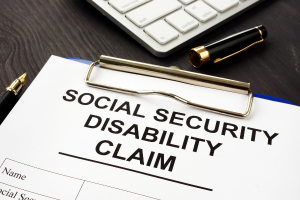Myths And Misconceptions About Social Security Disability Benefits

If you have a disability and are looking for information about Social Security disability benefits, it’s easy to come across a lot of misinformation. Read about the top 10 myths that we encounter regarding Social Security disability benefits. Then read through our commonly asked questions and application process.
Top 10 Myths About Social Security Disability Benefits
- Myth 1: It’s easy to get approved.
- Myth 2: You must be permanently disabled to qualify.
- Myth 3: You need to have been disabled for a year before you qualify for disability benefits.
- Myth 4: You can’t work at all while receiving disability benefits.
- Myth 5: You can’t be currently working while applying for disability benefits.
- Myth 6: You can’t receive workers’ compensation and Social Security disability benefits simultaneously.
- Myth 7: Only physical disabilities qualify.
- Myth 8: Children cannot receive disability benefits.
- Myth 9: Alcohol or drug use automatically disqualifies you from Social Security disability benefits.
- Myth 10: Social Security disability benefits are only for U.S. citizens.
Myth 1: It’s easy to get approved.
It’s rather difficult for disability benefits applicants to get approved at the initial and reconsideration levels, especially without the help of a Social Security disability attorney. According to 2022 workload data from the Social Security Administration, 62% of applicants are denied at the initial level, and 85% are denied at the reconsideration stage.
Applications for Social Security disability benefits are often denied for medical and/or technical reasons. Hiring a Social Security disability attorney can help prevent rejections based on errors in your application.
Myth 2: You must be permanently disabled to qualify.
Social Security disability benefits are available to anyone with a long-term disability that impacts their ability to work. While a disability does not have to be permanent, it has to be expected to last at least 12 months or result in death.
Myth 3: You need to have been disabled for a year before you qualify for disability benefits.
This is a misunderstanding of the 12-month rule as it applies to Social Security disability benefits. Your disability has to be expected to last at least 12 months from its onset.
Myth 4: You can’t work at all while receiving disability benefits.
You can work while receiving disability benefits, but your ability to do so is limited by the eligibility criteria set by the Social Security Administration. To qualify for disability benefits, you cannot work or generate income that exceeds the threshold of substantial gainful activity (SGA).
The term “substantial gainful activity” describes a level of work. “Substantial” refers to the work requiring certain mental and physical efforts and abilities. “Gainful” refers to the work generating pay or profit. The amount considered “substantial gainful activity” is updated yearly, and is generally higher for blind individuals. The “SGA” threshold for 2024 is $2590 for blind individuals and $1550 for non-blind individuals.
Myth 5: You can’t be currently working while applying for disability benefits.
The subject of working while on disability benefits is a little more nuanced. Generally speaking, you cannot be currently working at or above the threshold of substantial gainful activity, which is a key factor in determining eligibility for disability benefits.
However, programs called “work incentives” exist to allow people with disabilities to work part-time while receiving SSDI or SSI benefits. Different work incentives exist for SSDI and SSI recipients, respectively. Here’s general information about work incentives.
Myth 6: You can’t receive workers’ compensation and Social Security disability benefits simultaneously.
You may receive workers’ compensation and Social Security Disability Insurance (SSDI) at the same time. However, workers’ compensation may reduce your disability benefits. Workers’ compensation payments are paid out due to a job-related injury or illness, and may be paid out by governmental compensation agencies, employers or insurance companies on employers’ behalf.
If you receive workers’ compensation and SSDI simultaneously, the total amount of these benefits cannot exceed 80% of your average current earnings before you become disabled. Learn more about how workers’ compensation affects Social Security disability benefits.
Myth 7: Only physical disabilities apply.
Both physical disabilities and mental health conditions can qualify you for Social Security disability benefits if they significantly impair your ability to work. The Social Security Administration keeps a manual called the Listing of Impairments. If your disorder or condition is not found in this manual, your condition will be compared to a similar listing in the manual.
Learn more about the types of disabilities that qualify you for Social Security disability benefits.
Myth 8: Children cannot receive disability benefits.
Children with disabilities and children of disabled parents can receive benefits from the Social Security Administration.
If a parent with a disability receives SSDI, children may be able to receive auxiliary benefits regardless if the children are disabled themselves. If a child is disabled and under 18, the guardian may be eligible for a Disabled Child claim under SSI.
Myth 9: Alcohol or drug use automatically disqualifies you from Social Security disability benefits.
This is a misunderstanding of a restriction on alcohol and drug use as it pertains to eligibility for Social Security disability benefits. An applicant may be denied Social Security disability benefits if alcoholism or drug abuse “substantially contributes to one’s disabling condition.”
In other words, substance abuse could not have caused your disability or made your disability worse. If you currently abuse substances and ceasing substance use would improve your impairments significantly, the Social Security Administration may deny your claim.
We recommend consulting with a Social Security disability attorney for further specifics.
Myth 10: Social Security disability benefits are only for U.S. citizens.
Non-citizens are eligible to apply for both Social Security Disability Insurance and Supplemental Security Income. However, restrictions apply. One of the main restrictions is that they have to prove they reside in the United States legally.
To qualify for SSDI, non-citizens must have paid into the Social Security system and have either a Social Security number (assigned to them on or after January 1, 2004) that authorizes them to work in the U.S., or have a non-immigrant visa that is a B-1, D-1 or D-2.
To qualify for SSI, non-citizens have to be “qualified aliens.” In other words, they have to fit one of the classifications provided by the Department of Homeland Security.
Consult a Social Security Disability Attorney Today
If you have further questions about the limitations of or your eligibility for Social Security disability benefits, contact us at 833-MY-DISABILITY (833-693-4722) for a free consultation.
Do not pursue the disability application or appeals process alone. If you are unable or no longer able to work due to a disability, our Social Security disability attorneys can help you obtain SSDI or SSI benefits. There are no upfront fees for our consultations, representation or other disability services.
